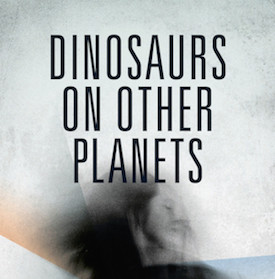Laura Kenwright casts a critical eye over Danielle McLaughlin’s debut collection of short stories Dinosaurs on Other Planets.
Like the best fiction, Danielle McLaughlin’s debut short story collection feels bigger than the sum of its parts.
The prose is taut, narratives whittled, characterisation disturbing and potent, but so much more than this, the stories magnify the little moments, so beautifully suited to short stories, that make a life. It’s not the big moments that make us who we are and what is important, but a collection of tiny moments that create us. Dinosaurs on Other Planets makes the insignificant significant. Each story, and their relationship with one another, showcases how we are all vulnerable; never invincible or too far from potential emotional or physical disaster.
 Dinosaurs on Other Planets is the much anticipated debut short story collection from twice New Yorker published writer Danielle McLaughlin. Published by the consistently solid, sharp and groundbreaking Irish publishers The Stinging Fly, whose recent output includes Colin Barrett’s Frank O’Connor and The Guardian First Book Award-winning Young Skins and Claire-Louise Bennett’s Pond. McLaughlin’s collection shares a familiar tone voice with these texts that are simultaneously natural yet disturbing in their potency.
Dinosaurs on Other Planets is the much anticipated debut short story collection from twice New Yorker published writer Danielle McLaughlin. Published by the consistently solid, sharp and groundbreaking Irish publishers The Stinging Fly, whose recent output includes Colin Barrett’s Frank O’Connor and The Guardian First Book Award-winning Young Skins and Claire-Louise Bennett’s Pond. McLaughlin’s collection shares a familiar tone voice with these texts that are simultaneously natural yet disturbing in their potency.
This eleven-story collection is not for the faint-hearted:
‘Inside were the skinned corpses of the mink, pink and slippery and hairless.’ (‘Night of the Silver Fox’) ‘a dozen or so dead, wing-less bluebottles.’ (‘The Smell of Dead Flowers’) ‘She reached out a hand and touched the seal pup’s head. It flinched but did not pull away, its eyes, black as onyx, beginning to lose focus.’ (‘A Different Country’).
Dead animals thread through Dinosaurs on Other Planets – stark subject matter reflected by potent prose; a voice that is consistently stripped back to its bare, beautiful bones. At times, reading this collection is similar to reading poetry, certainly in terms of the purity and precision of voice: ‘the air was sweet, the scent of pine needles mingling with the smell of wild flowers, the green of the meadows gloriously ruptured with bursts of purples and yellows and blues.’ (‘Not Oleanders’). However, this isn’t some sort of experiment with verse – the stories are constructed of strong narratives and characterisation.
Fraying families, warped and melted, are explored through a number of McLaughlin’s stories. In ‘Silhouette’, the relationship between Aileen and her mother is brooding and complex: ‘their conversation had a curious dynamic – a decorous yet vaguely malicious chipping away at each other, the way a child might pick slyly at a scab.’ Similarly: ‘It lingers beneath the surface, quivering like a small but troublesome cyst.’ (‘The Smell of Dead Flowers’) – these similes epitomise the collection’s study of malaise.
Within each fractured familial/romantic relationship there lurks an expertly crafted threat of something wrong, something perverse. Inappropriate relationships are the dominant manifestation of this within the world of Dinosaurs on Other Planets; ambiguous sexual tension between an alcoholic and young girl in ‘Those That I Fight I Do Not Hate’ and between a mother-in-law and son-in-law in the (almost) eponymous story.
Most of the stories are written in the third person and this consistency compounds the distancing effect of the collection’s lonely and outcast characters. At times the regular rhythm of the third person evokes a sense of inevitable disaster; a news reporter allowing you to effectively anticipate their next phrase or occurrence through the sincere familiarity of tone.
The collection flows darkly, beautifully. However, this flow is jarred a little by ‘Not Oleanders’, a story that itself feels like an outcast, unusually set outside Ireland and is a little stagnant compared to the other stories. ‘Not Oleanders’ feels introspective and indulgent compared to a collection that on the whole, excels in its ability to look outwards in landscape and behaviour. Standout stories, for their extraordinarily powerful and original characterisation are ‘The Smell of Dead Flowers’ (which, a month after reading, still makes me feel uneasy when I think about it), ‘Night of the Silver Fox’ for its perfect tension and the opening story ‘The Art of Foot Binding’, for its clear-cut prose: ‘Janice watches her daughter attempt to curl her toes underneath her foot, watches them spring back up again.’ This opening story is stylish, fragrant, raw and whole.
The detail, sense of loss and sadness of these stories show that ultimately, although we are surrounded by countless distractions to ensure we never have to think properly again if we don’t want to; what we really are, what defines us and what matters, are those close to us, by choice or by blood. It is how we navigate these relationships that define us. McLaughlin explores the darker choices and behaviours of her characters through prose that shakes to the core, at times subtle, at times disturbing. Dinosaurs on Other Planets will cause waves, and lingers in the memory long after finishing reading.
Dinosaurs on Other Planets is available from The Stinging Fly Press.
Laura Kenwright is a writer and frequent contributor for Wales Arts Review.












